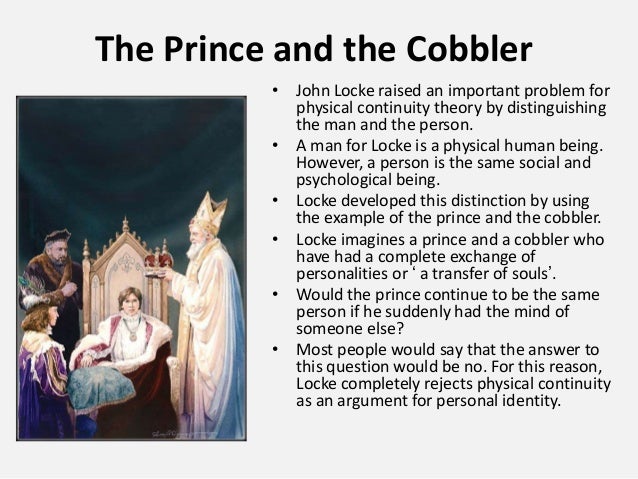Locke
contributed to the identity of the United States, he influenced the founding
fathers on writing the U.S Constitution to give us the right for life, freedom,
happiness, and property. In comparison, his personal philosophy “I could be the
same man, but not the same person I
was previously, “Is a claim that, what makes us the same person over time is
our consciousness, our awareness of our own selves. He asserts, “What you can’t
remember isn’t a part of you as a person.” Basically, you are a reflection of
your memories, regardless of the form of your body. Locke gives an example of
his philosophy through the illustration of the prince and cobbler.
“If
you have the prince’s memories, then you are the prince. If you have the
cobbler’s memories, you are the cobbler, even if you have the body of a prince.
If the cobbler had committed a crime, it would be the one with the prince’s
body that we should hold responsible for it.”
If Locke is
right that our consciousness keeps us aware of ourselves, which I think he is,
then we need to stay in tune with our souls so, we know that we are the same
person as before. Therefore, we will always know our personal identity.
Alongside personal identity, Locke believed that
God would only punish people for crimes that they remembered committing. He
states, “Someone who no longer remembered doing evil wouldn’t be the same
person who committed the crime.” In other words, that person cannot be punished
for actions, he/she doesn’t remember. On the one hand, I agree with Locke that
someone shouldn’t be punished for actions they don’t remember because, that person
maybe different from those previous memories. But on the other hand, if that
person killed or raped people, those actions shouldn’t get the benefit of the
doubt. By extension, it all depends on how that person’s current actions, stand
with his previous actions. For example, if a person robbed a store 5 years ago
and he’s continually robbing stores today; I doubt that someone would say that
he’s a changed person. However, if a person robbed a store 5 years ago and
never robbed one again, he has a stronger case for change in the court system. In
relation, he would have a stronger case for the appeal that he is no longer a
recollection of his previous actions. Therefore, it’s possible that person no
longer reminisces on their previous memories of robbing, in result, molding
them into a new person.
In
sum, Locke’s philosophy of personal identity correlates heavily on what we hold
in our consciousness. Locke’s account of freedom of action is also connected with his views of personal identity. Freedom to review the decisions we made are very essential in our awareness of our souls and identity. Also, it is very
important in being able to operate the law because you can bring new ideas and
concepts to the table.
In
conclusion, Locke’s philosophies were ahead of his time, making him one of the
greatest philosophers of all time. He has one of the greatest minds known to
the world.
P.S- Information
pertaining to personal identity was found in A Little History of Philosophy pgs. 81-86.
Link to 1st installment: http://cophilosophy.blogspot.com/2017/04/section-8-devin-willis-installment-1.html

I liked how you went into great detail into John Locke's philosophy, views, and values. The Prince and the Cobbler was a great example to show the insight of John Locke's philosophy. John illustrates in the Prince of Cobbler personality identity is based on physical boundaries. I agree with Devin because our memories make us the people we are today no matter if we are in different bodies. Our personal identity is based on our consciousness, so matter what physical body we are in as long as we have our personal consciousness we are still the same person. I like how Devin Makes a clear distinction between man and a person. A man being just a physical body, while a person is a physical body with a soul. I do not agree with Devin when Devin says that people should be excused from crimes they do not remember. Devin says their exceptions like rape or murder, but I feel like their should be any exceptions because it does not matter if the person did the crime remembers it because someone else will remember that is not the individual that did the crime. Overall I loved Devin's second installment made me more interested in learning more John Locke.
ReplyDelete